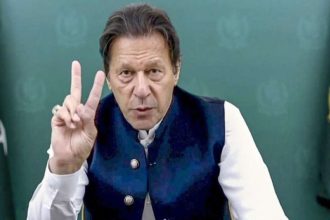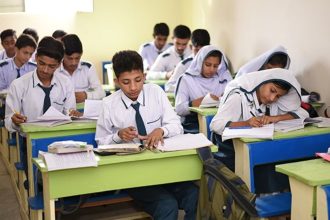Prime Minister Nawaz Sharif has ordered swift legislation to purge the country of illegal weapons. “I want the whole country to be de-weaponised,” he told his cabinet colleagues during the apex committee’s meeting held at his office on Thursday.
The interior division will formulate a draft policy for de-weaponisation of the country, and consultations with all the provinces and stakeholders have already begun, the premier said. “There is no room for sectarianism in Pakistan. Such organisations will not be allowed to work in the country. The government has started taking action against them,” the premier was quoted as saying in the minutes of the cabinet meeting. All the relevant ministries/divisions should suggest appropriate amendments in the laws for NAP’s effective implementation, he ordered.
Poor execution of nine of the 20 areas of NAP has irked the prime minister, who directed Interior Minister Chaudhry Nisar Ali Khan to take these points seriously.
Listing the nine weak points, the premier said a lot needs to be done as regards madrassas, the Pakistan Electronic Media Regulatory Authority, terrorist financing, reforms in the Federally Administered Tribal Areas, Afghan refugees, legal amendments, the National Counter-Terrorism Authority (Nacta), religious persecution and sectarianism.
The cabinet expressed satisfaction over progress in the remaining areas of the NAP: subscriber identity modules, executions, armed militias, speedy trial courts, hate speech, the Karachi operation, counterterrorism forces, militancy in Punjab, glorification of terrorists, proscribed organisations and Balochistan.
Terming the Karachi operation a key part of the NAP, Nawaz urged the Muttahida Qaumi Movement (MQM) to try to resolve their issues on the floor of the house instead of resigning from the assemblies.
Senator Mushahid Hussain Sayed, who was a member of the parliamentary committee that had formulated the 20 points of the action plan, said: “The glass is half full, as far as the national resolve to curb, contain and crush terrorism is concerned.”
For this campaign to reach its logical conclusion, Mushahid listed three vital factors: civil-military harmony is indispensable, the NAP should be a one-window operation run by an anti-terror tsar, and public opinion should be mobilised through a counter-narrative via the media.
“We should realise as a nation that it’s now or never, and we can’t allow any compulsions or constraints in this campaign. For too long our country has been hostage to self-imposed compulsions.”
Now the people are feeling a change for the better, and this factor is spawning a cautious ‘can-do’ optimism that the country can reverse the wrongs of the past and move forward with clarity, cohesion and commitment, he said.
Former Sindh police chief Afzal Ali Shigri observed that the military is playing a proactive role in executing the NAP.
Listing various reasons of slow progress of the NAP, he said: “As far as the first key point of de-radicalisation goes, unaddressed seminaries’ reforms are needed. A separate department cell of the police has yet to be established to tackle sectarian violence. Major amendments in the criminal justice system have yet to be made.” He also said that Nacta has yet to be strengthened.
MNA Ijazul Haq, who was also a member of the parliamentary committee, said the civilian government needs to alert the provinces with louder instructions for executing the plan more aggressively.
He demanded scrutiny of hundreds of thousands of arms licences issued in the past years. “This remains one of the main causes behind free flow of weapons that fuels violence across the country.”
On madrassa reforms, he proposed that a joint board of ministries of the interior, religious affairs and education take up the issue. “Lack of coordination between the government and madrassas’ representatives remains a major stumbling block to resolve this core issue since 2005.”





